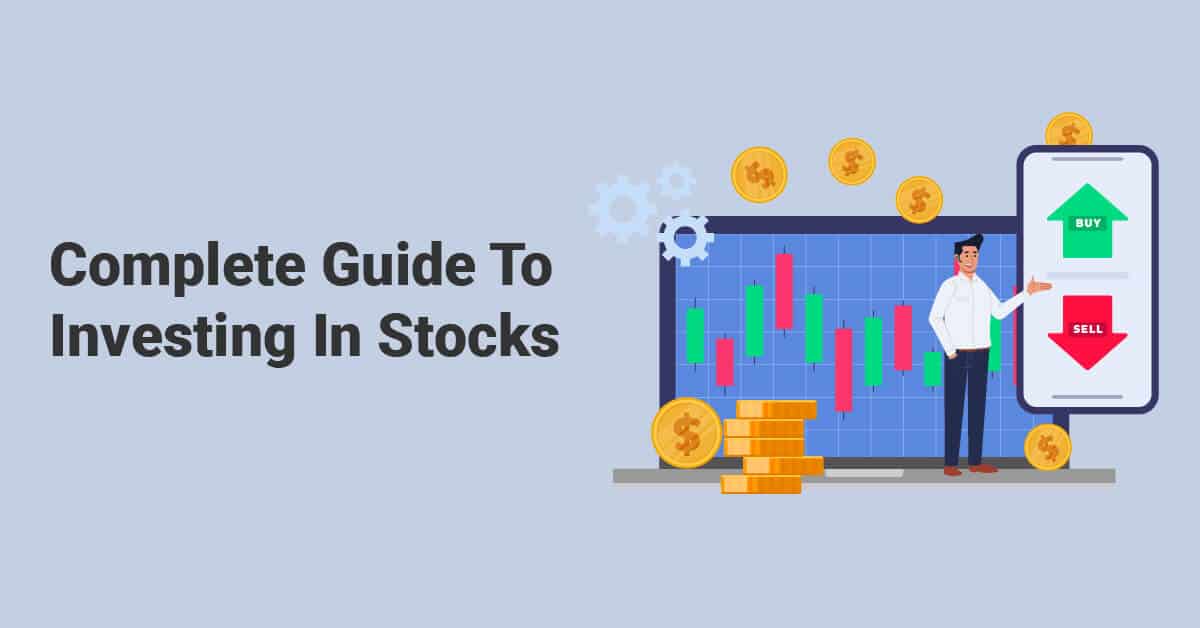Everything you need to know to start building your investment portfolio
Is investing really the key to achieving your financial goals?
If you ask any rich person for money advice, the majority of them will say that the best thing you can do is to start investing. Understandably, most of us are interested in investing, but the majority of us don’t know where to start.
You probably have a lot of questions – what type of investment should I be making? How do I buy my first stock? How much money should I invest? How do I keep my portfolio balanced? These are common questions and it is good to ask them. We are going to give you the answers to these questions today.
When you start investing, you will have to make a lot of choices, the first choice you will have to make is – what should I invest in.
There are a lot of options now – from crypto, property, to NFTs. We recommend, however, that you start with stocks. Eventually, you will need to branch out and diversify, but stocks are a solid foundation to build your investment empire on.
Stocks are a great way to build wealth over time. They offer diversification and growth potential, but also come with risks. If you want to get started investing in stocks, you’ll need to decide where to start.
In this article, we are going to look out how you can start your stock portfolio, where you should store your money, and share with you our Top 10 Tips for picking and investing in stocks.
Let’s start by looking at how to purchase your first stock.
Table of contents
The Basics

In this section, we are going to take a look at what stocks are, why you should invest in them, and what types of stocks you should consider investing in.
What Are Stocks?
“A stock is a form of security that indicates the holder has proportionate ownership in the issuing corporation.” Investopedia
When a company wants to raise money and gain more investments it will sell stocks and shares in the company. A stock is a representation of the part of the company you own.
As the company grows more profitable the stock will become more valuable. Stocks are traded on the Stock Market generally, but they can be sold in private sales. While stocks can be traded quickly, they tend to be held for longer periods of time than other investments like cryptocurrency.
Why Should I Invest In Stocks?
In the long run, stocks are the most profitable form of investment.
While investment portfolios should be as diverse as possible, most portfolios will mostly be made up of different types of stocks.
You can invest in almost everything via the stock market. If you want to make ethical or environmentally friendly investments this is also possible.
What Types Of Stocks Should I Invest In First?
The most reliable investments tend to be the most expensive.
For example, if you invest in Apple or gold then you will most likely make a profit. However, buying into these markets is usually beyond first time stock buyers.
Before you invest in any stock, you should look at its performance history. You want to make sure the company has been around for a few years and shows signs of a general upward trend.
Getting Started

If you are looking for a simple, step-by-step guide to purchasing your first stock then you have come to the right place.
We can’t tell you what to invest in, but we can show you how to prepare yourself to make that first investment and who to talk to about doing so.
Different Investment Account Options
The next choice you will need to make is how you are going to purchase and manage your stocks.
You can choose to do it all yourself, hire a financial advisor, or have your bank manage your portfolio for you.
Open A Brokerage Account
If you are confident in your own ability to pick and choose stocks then you can jump in at the deep end and open a Brokerage Account.
A Brokerage Account will give you access to trade on the many Stock Markets around the world. You will need to deposit your funds, use them to trade, and then withdraw your funds at a later date. It will not pay directly into your bank account.
If you want to be in control of your portfolio then you are going to want to use a Brokerage Account. This way you will not have to rely on anyone else if you see an investment opportunity and need to act on it quickly.
One of the benefits of doing everything yourself is that you do not have to pay fees to anyone else to handle your account. However, you usually have to pay commission to the app that you are using.
Hire A Financial Advisor
If you do not want to have to watch the market all the time, or you don’t feel comfortable making investing decisions on your own, then you may benefit from hiring a financial advisor.
This person will handle the day-to-day sales, trades, and paperwork of your investment portfolio for you.
The main downside of having a financial advisor is that you will have to pay their wages – which is not something most people can afford when they first start investing.
Choose A Robo-advisor
If you like the idea of having a financial advisor but don’t have the money to hire a human to do it, why not hire a robot.
This is not a plot from a Science Fiction book, robots have been trading on the stock market for a long time now. The machines will monitor trade patterns, going on to buy and sell when the patterns look promising.
The downside of using a robo-advisor is that they do everything by formulas, so they may not be able to notice the value of a non-traditional company or investing opportunity.
Use A Direct Stock Purchase Plan
If you are not interested in working with anyone else and you don’t want to have to pay a broker or brokerage account commission – then you should try using a direct stock purchase plan (DSPP).
Some companies offer a DSPP that allows buyers to purchase stock directly from the company without having to go through a third party.
The downside of this is that not all companies have this option, so you are limited in what you can purchase.
Open An Account Through Your Bank
If all of the above options sound too labor intensive or time consuming for you then you should look into investing with your bank.
Many banks offer investment ISAs. All you have to do with these accounts is to deposit the money you want invested and the bank will create and manage a portfolio for you.
You can choose how aggressively your bank invests the money for you and how much of your profits are reinvested.
Like with other forms of investment there is still a risk that you can lose money with these types of bank accounts.
How To Fund Your Account

When you are putting together your portfolio you are going to want to set yourself investment goals (how much money you are investing) and profit goals (how much money you are making).
You should be aware that not all of your money goes toward the stocks, and there are costs (like the three below) that will eat into your investments if you do not keep an eye on them.
Mutual Fund Minimums
Some stocks have a minimum buy in price. This is something you usually see with the more popular and expensive stocks.
Some companies will allow you to buy as much or as little of a stock as you want, but others may have a minimum buy-in of hundreds of dollars (i.e $750+).
When you first start investing, you will want to look for stocks that have no minimum funds.
Trading Commissions
If you want to buy stocks you will either have to use a broker or a brokerage account, unless you are lucky enough to find a good DSPP option.
These brokers will charge you a commission on any profits they make. For example, they might take 1-5% commission per transaction.
It is worth noting that some accounts and brokers charge a fee for every transaction even the ones which you lose money on. These fees can really eat into your profits if you trade too much too quickly.
Mutual Fund Fees
Trading and buying mutual funds can seem like a great option for people who want a low maintenance portfolio.
However, you want to make sure that you understand the “load” attached to your mutual fund when you buy them.
A load can refer to upfront and/or back-end charges that are made when you trade mutual funds. If you are not careful you may have to pay both of these fees.
Read the small print on your investments before you purchase to avoid unexpected fees like this.
Different Types Of Stock Investment Accounts

If you are interested in investing, but don’t have the time to actively monitor the market and make purchases yourself, then you should set up a stock investment account with your bank.
These accounts are typically attached to an education qualification or to retirement. But they will provide you with a small amount of tax relief and you will be able to earn interest on your savings and investments at the same time.
Educational Savings Account

If you are saving up for a formal education qualification then you can open an investment account for this purpose that is taxed differently to traditional savings accounts.
Some banks may impose limits on the type of qualifications you can spend this money on.
You will be able to invest in stocks with these types of accounts using target-data portfolios and mutual funds.
Taxable Investment Account

One of the benefits of putting your money into an education savings or retirement-destined investment account is that your contributions are usually exempt from taxes. Although many of them have yearly contribution limits.
You will be taxed on any profits your investments make.
Retirement Account

There are two main types of retirement accounts – the 401(k) and the IRAs (individual retirement accounts).
You can only have access to a 401(k) via your employer but you will have to change the 401(k) system every time you change jobs.
Investment IRAs can be set up by an individual and you can keep them for your whole life no matter your employment status.
It is also worth exploring whether a 401(b), solo 401(k)s, and SEP-IRAs would be a good option for you if you are self-employed or your company does not offer one of the main two types of retirement accounts.
10 Helpful Tips For First Time Investors

Before we leave you, we wanted to share with you 10 tips that we wish we had been given when we first started investing.
Set An Investment Budget
When it comes to your money, you want to find a balance between investing in your future and being able to live comfortably now. It is not uncommon for people to lean too far in one direction.
The general rule of thumb for investing is that you should only invest money that you can afford to lose.
If you earn $2000 a month and your bills, rent, and living costs add up to $1500 then you don’t want to invest more than $400 a month.
To work out what your ideal investment budget should be, sit down and take a look at your finances. Think about how much money you want to have saved by when, work backwards, and workout how much you need to deposit each month.
You should aim to invest all of the money you set aside each month. However, if you feel like the options aren’t out there then put some of the money aside for next month. More stocks will become available.
You don’t want to put your money into a bad fund just for the sake of hitting your investment goals.
Focus On Your Long Term Goals
The average stock is held for 4 months before being traded on. As a whole, the market for trading stocks is a lot slower than trading other assets like Cryptocurrency and NTFs.
As we mentioned earlier, if you want to make a long term profit then investing in stocks is your best option. Over a few decades, the average stock market return is about 10% per year. You should keep this in mind when you start trading.
It can be tempting when you first start trading to sell your stock as soon as it starts to make any kind of profit. However, in general, you will be better off holding your stock for 3-4 months.
If you have stocks in larger companies then you may want to consider holding your stock for a few years. These stocks may have a more expensive buy-in, but in the long run they will have a more predictable profit.
When trading stocks it is important to have a mindset based around the long term profit. Some years will be good, some years will be bad, but if you invest in the right stocks, over a longer period of time you will make a profit.
Create A Portfolio
You will hear the word “portfolio” thrown about in financial circles all the time. But what does it actually mean?
Well, you can put together an investment portfolio by investing in more than one thing. Technically, your portfolio is your collection of investments and saving accounts. It is not a concept to be scared of or shy away from.
When financial experts talk about creating a portfolio they often encourage people to make their portfolios as diverse as possible.
To diversify your portfolio means to invest in multiple different assets. For some people this can mean investing in stocks, property, and Cryptocurrency. For others it means investing in stocks and having savings accounts. While for some this can mean investing in stocks from different industries and parts of the world.
Why is diversification so important? Well, the key idea behind it is to avoid losing all of your money if the market crashes.
If you have invested in Silver, you will notice that stock prices in the metal drop every time a new mine opens. If you have all your money invested into Silver during that period you could lose anything.
However, if you have some of your money invested in Silver, some in oil, and some in a Fortune 500 company – then even if the Silver market crashes, you will be able to stay afloat.
If you decide to set up a stock investment bank account then you will not need to worry about this, as your bank will do the work for you.
Manage Your Portfolio
Once you have set up your portfolio, you will need to work on maintaining it and keeping it profitable. You will need to do this to achieve your long term goals.
You will need to work out how much time you can spend on your portfolio every week or month. You can spend this time researching new stock options, checking the value of your current portfolio, and keeping track of how the market is performing.
You will have to look at how your stock is performing and make the call about whether you should sell it or hold it for a little bit longer. As you get closer to retirement, you should consider investing less aggressively than you previously have.
If you have a stock investment bank account then you will not need to concern yourself with this.
Know The Risks
It has been said that in investing, the biggest risks offer the biggest rewards. In some cases, this may be true, but there is no guarantee of making a profit from investing. While many people do make a profit from investing in stocks, this is not the case for everyone due to the way the market works.
Before you start investing you should be aware that there is no guarantee that you will make money from investing – there is always a risk.
It is this risk, however, that opens up the possibility for people to make money from investing in stocks. And compared to some other forms of investing, the stock market is very stable and fairly predictable.
Another benefit of investing in stocks over Cryptocurrency and NFTs is that the stock market is regulated. This means that if someone steals money from you or purposefully manipulates the market in order to make a profit at the expense of others – they can be arrested and sent to jail. You can also sue the person who stole from you.
There are no such restrictions surrounding NFTs and Cryptocurrencies, if someone steals from or scams you then you can do nothing about it.
Pick Your Companies Strategically
You wouldn’t bet your money on a card game that you have never played before, so why would you invest in a company that you have not fully researched.
When you are doing your research into the company, try not to get distracted by unnecessary information about the company. Instead, focus on its financial plan, its stock prices, and the profits it is publishing.
You are not becoming a board member for the company when you invest, you are just betting on the success of the company. You want to be aware of the market it operates in, its long term prospects, and its competitors.
When you are watching the Financial channel or looking up stock tips online, it can be tempting to buy anything stock that is strong. But, as we mentioned earlier, you need to think about your long term goals when you are buying stocks.
If you can, you want to buy-in well-established companies who have a strong business plan and an established customer base. However, you may discover a new company while doing your research that you think has potential. If you believe in them, why not invest in them.
Plan Ahead
There are going to be days when you want to give up on investing, sell all of your stocks, and go live in the woods. You need to be prepared for days like these if investing is a serious part of your long term financial plan.
If you acted on these impulses when they appeared you could throw off your whole financial plan. You could also lose money.
One of the tips shared by financial experts to help you on these days is to journal. Yes, they really recommend you journal.
When you first start investing, you should make a note of your purpose for investing and what you hope to achieve because of it.
On the days when you are struggling with the concept of investing, sit down and think about your dream life. Then write down how your investments can take you a few steps closer to this vision.
This is an easy way to regain motivation for the process of investing.
You should also set out a list of circumstances in which you would consider selling your stocks. Whenever you feel like selling all of your assets take another look at this list.
Avoid Trading Overactivity
If you have never invested in anything before, then you should be prepared for the urge to check how your stocks are performing every day. If you have a trading app on your phone or an account on your laptop then it is all too easy to do this.
However, this is something you should try to avoid. Constantly checking how the market is performing will only lead to higher stress levels and a sense that you are not making any progress with your investments.
We mentioned earlier that stocks perform best over the long term. If you want to see a real profit then you need to hold onto stocks when you can and allow them to become more valuable over time.
There may be times when prices start to spike and you want to sell. It is okay to do this. Instead of constantly checking your stocks, we recommend that you set up alerts that will inform you of any major changes in the value of your portfolio. You will only need to check your numbers when you get an alert.
There is no need to buy and sell stocks every day or even every week.
Sell A Losing Stock
Are there some circumstances where you should sell stock quickly? Yes, and one of these circumstances is if the stock is losing value fast.
You might be tempted to hold onto the stock in the hope that it will bounce back, but there is no guarantee that this will happen (unless you have stocks in a very big company or an asset like gold).
You are better to sell a losing stock as quickly as you can. Losing money is just part of trading stocks, it happens to all of us at least once in our trading careers. Selling losing stock before it bottoms out will give you a chance to recuperate a small amount of your money.
You may feel like you have failed the first time this happens to you, but we encourage you to see it as nothing more than a learning experience. You will need to pick yourself up, brush yourself off, and carry on trading. But now, you will be slightly wiser than you were before.
It is best to learn these lessons earlier on and only lose a small amount of money, then to grow complacent and lose a big chunk of cash later down the line.
Do Not Overemphasize
When you see that one of your stocks is performing well it can be tempting to put a greater percentage of your money into that stock. In the hope of increasing your eventual profit.
Doing this can pay off in a few circumstances, however, it is generally not advised. If that stock then crashes, you will find your wallet starts to hurt.
When you are looking into a stock, you should try to take all of the valuing metrics into account and not focus on one of these metrics too heavily.
For example, many investors get stuck on the idea of getting the best P/E (price-to-earnings) ratio. In some cases, a low P/E ratio can indicate that a stock is undervalued and you will be able to make a good profit from it.
This is not always the case and the P/E does not and cannot show the whole picture. Focusing on one metric too closely can be misleading and lead to you making mistakes or losing money.
Summary

According to Investopedia, consistently stocks outperform other forms of investment in the long run. This is why you will want to build a solid portfolio of stocks before you start investing in any other area.
Options like crypto and NFTs can give you profit in the short term, but neither have existed long enough for any of us to know how they will perform in the long run.
If you are saving for a home, a fast car, or for your retirement then you are going to want to invest in something that has proven to have long term benefits – stocks are just what you need.
There are many different ways to invest in stocks – but you will find a beginners guide in the article above. Good luck. The best day to start investing was yesterday, the second best day is today.
